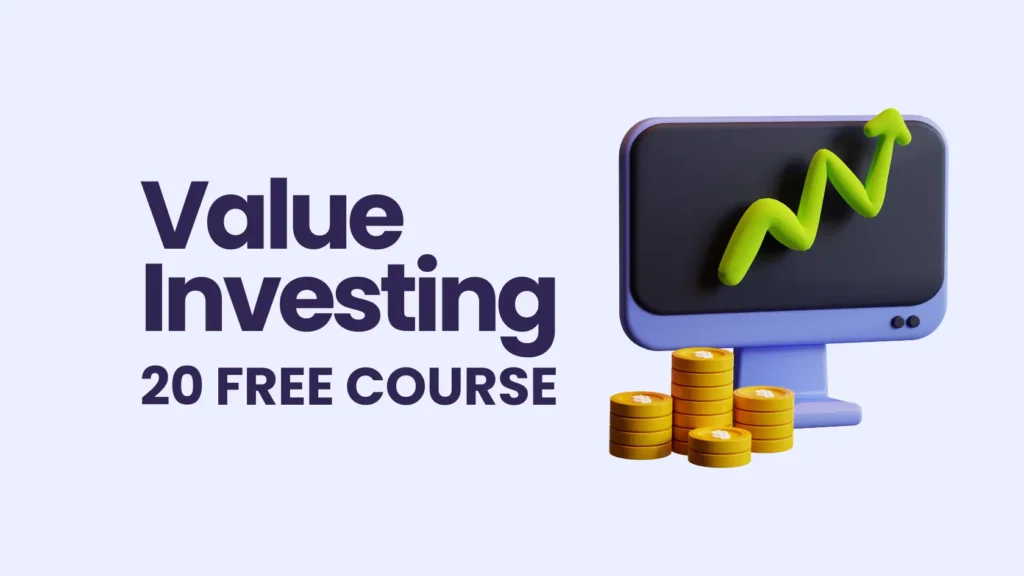Have you ever wondered how legendary investors like Warren Buffett consistently build wealth through the stock market? The answer lies in value investing, a strategy that focuses on identifying undervalued companies with long-term potential. But learning this skill can seem daunting, especially if you’re new to the world of financial markets.
The good news is that you don’t have to spend a fortune on expensive courses to learn value investing. There are plenty of free online resources available, we curated 10 value investing courses that can guide you on this path to financial freedom.
Think of these courses as your investment in your future. Just like fundamental analysis is crucial in understanding a company’s true worth, learning value momentum investing can help you identify stocks that are poised for growth.
Why Learn Value Investing?
Before diving into the courses, let’s discuss why value investing is worth your time. At its core, value investing is about finding stocks that are trading for less than their intrinsic value. This involves a lot of fundamental analysis, looking at financial statements, understanding a company’s business model, and assessing its competitive position in the industry.
Warren Buffett, perhaps the most famous value investor, has built his fortune using these principles. By understanding how to evaluate companies thoroughly, you can make informed decisions that potentially lead to long-term wealth creation.
What You Can Expect to Learn from These Free Courses
Diving into these value investing courses will equip you with a wealth of knowledge and practical skills. Here’s a breakdown of what you can expect to learn:
1. Fundamental Analysis
- Understanding Financial Statements: Learn how to read and interpret balance sheets, income statements, and cash flow statements.
- Evaluating Company Performance: Assess a company’s profitability, liquidity, and solvency to determine its intrinsic value.
- Industry and Market Analysis: Gain insights into how broader market trends and industry dynamics impact individual companies.
2. Value Momentum Investing
- Combining Value and Momentum: Discover how to blend value investing principles with momentum strategies to maximize returns.
- Identifying Trends: Learn techniques to spot market trends and use them to your advantage.
3. Investment Strategies from Buffett and Other Experts
- Warren Buffett’s Principles: Study the core investment philosophies of Warren Buffett, including his focus on long-term value and margin of safety.
- Case Studies: Analyze real-world examples of successful value investments made by legendary investors.
4. Stock Market Essentials
- Investing 101: Cover the basics of the stock market, including how stocks are bought and sold, and the role of stock exchanges.
- Stock Trading Techniques: Learn the fundamentals of trading stocks, including technical analysis and trading psychology.
5. Financial Modeling and Valuation
- Building Financial Models: Create detailed financial models to forecast a company’s future performance.
- Valuation Techniques: Master various valuation methods such as Discounted Cash Flow (DCF) analysis and comparable company analysis.
6. Identifying Undervalued Stocks
- Screening for Value: Learn how to use financial ratios and metrics like Price-to-Earnings (P/E), Price-to-Book (P/B), and Dividend Yield to identify undervalued stocks.
- Assessing Competitive Advantage: Understand the importance of a company’s competitive moat and how it contributes to long-term value.
7. Risk Management and Margin of Safety
- Calculating Margin of Safety: Determine the difference between a stock’s intrinsic value and its market price to minimize risk.
- Diversification Strategies: Learn how to spread your investments across different sectors and asset classes to reduce exposure to market volatility.
8. Behavioral Finance
- Psychological Biases: Explore common psychological biases that affect investor behavior, such as overconfidence and herd mentality.
- Decision-Making Frameworks: Develop structured approaches to making rational investment decisions under uncertainty.
9. Advanced Topics and Practical Applications
- Portfolio Management: Learn how to build and manage a diversified portfolio based on value investing principles.
- Financial Statement Analysis: Dive deeper into financial statement analysis to uncover hidden value in complex financial reports.
10. Resources and Community Support
- Downloadable Materials: Access a value investing course with a free download option for offline study.
- Certification and Accreditation: Some courses offer certificates upon completion, adding credibility to your newly acquired skills.
Ready to learn from the best?
20 Free Value Investing Courses to Get You Started –
Quick Navigation
ToggleValue Investing Fundamentals For Beginners

This Course “Value Investing Fundamentals” offers a comprehensive, streamlined approach to mastering value investing in just two hours. Designed for those eager to grow their investment portfolios strategically, this course focuses on essential principles and practical strategies to identify undervalued companies with sustainable competitive advantages. Learn to evaluate financial strength, assess management teams, and employ a Margin of Safety to minimize risks. Whether you’re new to investing or seeking to refine your approach, this course equips you with actionable insights to make informed investment decisions confidently. Enroll now to unlock the secrets of value investing and accelerate your path to financial success.
How Value Investing Works

Beginner Valuation and Investing
Introduction to Value Investing

This Course “Introduction to Value Investing” delves into the foundational principles of one of the most revered investment strategies, favored by icons like Warren Buffet and Peter Lynch. Drawing from over two decades of personal experience in financial markets, the course highlights four key attributes of value investing: reliability, practicality, semi-passivity, and scalability. It offers a clear, accessible overview suitable for anyone eager to navigate the stock market with a disciplined approach. Whether you’re new to investing or seeking to refine your strategy, this course provides essential insights to set you on the path to investment success.
Value Investing Strategies
This foundational course introduces and illustrates the components of total investors’ returns, and how to apply balanced value investing strategies to optimize total risk and returns for investors in equity. It explains and illustrates intrinsic valuation techniques including earnings and EBITA (or EBITDA) multiples valuation, the dividend valuation model (DVM), and discounted cash flow (DCF). It also discusses and illustrates net assets valuation, market-to-book ratios (MBR), portfolio construction, and qualitative and behavioral success factors including client relationship management.
Content for the course is designed and delivered by a financial industry practitioner with an extensive practical understanding of the investment markets. Each course is rigorous, including two practice questions per lesson, and a final, graded assessment of 20 questions involving all lessons and sections. This program is designed for anyone interested in understanding how to apply value investing techniques to investment selection, including private investors, people already working within a financial institution in the front, middle, or back-office areas, or seeking entry to one of these roles. Basic understanding of investments, stocks, and stock markets.
Investment Management Specialization
In this Specialization, you will understand how investment strategies are designed to reach financial goals in a global context. You will learn the theory that underlies strong investment decisions, as well as practical, real-world skills that you can apply when discussing investment proposals with your advisor, managing your personal assets, or your client’s investment portfolio. You will start by developing a global understanding of financial markets and what impacts rational and irrational behaviors have in finance at the micro and macro levels. You will then learn how to adequately build and manage a portfolio with a long-term view while gaining an appreciation for novel research advances in finance and related areas as well as future trends that are shaping the investment management industry. In the final Capstone Project, you will create a sensible 5-year investment plan that accounts for an investor’s goals and constraints in a dynamic economic landscape.
Stocks and Bonds
This course, “Foundational Finance for Strategic Decision Making,” equips you with essential skills in Time Value of Money (TVM), focusing on stocks and bonds. Dive into diverse bond types like Zero Coupon and Government bonds, mastering pricing calculations directly tied to market insights. Explore stock dynamics, distinguishing growth from dividend stocks, and leveraging market data effectively. By course completion, you’ll confidently navigate how savers fund governments and corporations, applying this knowledge to personal and corporate financial strategies alike. Ideal for beginners, this course sets a solid foundation in finance, preparing you for informed investment decisions and strategic financial planning.
Stock Valuation with Dividend Discount Model
In this 1-hour long project-based course, you will learn how to find the dividend growth rate and cost of equity and use that to find the fair price of a share. This will teach you how to value stocks using the Dividend Discount Model (DDM) – one of the most common methods equity research analysts use to value stocks.
Financial Markets
This course, “Risk Management and Financial Institutions,” offers a comprehensive exploration of risk management and financial institutions, crucial for cultivating financially-savvy leadership skills. Delve into behavioral finance and risk management principles, gaining insights into how securities, insurance, and banking sectors operate in the real world. With a focus on current practices and future prospects, this course equips you to harness these industries effectively for societal advancement. Whether you’re looking to enhance your understanding of financial systems or to lead with confidence in risk management, this course provides foundational knowledge essential for navigating the complexities of today’s financial landscape.
Understanding Stock and Bond Investment

ETF, Index Fund, and Mutual Fund Investing

How to Generate Passive Income With Dividend Investing

Stock Market Investing for Beginners

This course is all about introducing you to the exciting world of the stock market, taking you from the very foundations of “What is a stock?” to teaching you about different investing strategies, like Fundamental and Technical analysis, and also discussing the investment strategies used by some of the most successful investors in the world, like Warren Buffett and Peter Lynch, who both achieved tremendous track records over 40+ year-long careers. After each set of lectures, you will have the chance to test your knowledge by taking quizzes on the material covered. By the end of the course, you will receive a certificate showing you successfully finished. The course is designed to give you a solid introduction to the markets and its ins and outs.
Stock Market Investing During a Recession

This compact course, “Recession Investing Essentials,” offers valuable insights into navigating stock market downturns effectively. Despite common fears, historical data shows the stock market’s resilience, averaging 6% to 7% annual returns over the last 50 years. Led by VIA Financial Education UG, this course teaches essential recession investing strategies, emphasizing opportunities to acquire quality stocks at discounted prices during economic downturns. Drawing on the wisdom of investment legends like Warren Buffett and Benjamin Graham, coupled with over a decade of practical experience in stock market analysis, this course equips students, particularly those interested in value and macro investing, with actionable knowledge to thrive in challenging economic climates and build lasting wealth.
Beginner’s Guide To Investing In Asian Stock Markets

Explore how to harness Asia’s promising future through smart investing with our FREE beginner’s course. Designed for those starting with zero financial knowledge, this course simplifies stock market investment. Discover the essentials to build your wealth in Asia, even without prior experience. Start your journey to financial growth today!
Invest like the best (for the rest of us)

Learn how investing in the stock market yourself can be beneficial and easy to do as well as have great performance. You will learn why taking control of your investing and retirement destiny can be a good thing and what stock-picking strategies have been most effective over time. This course also makes use of the latest in education technology techniques to aid in learning and remembering the material.
Investment Analysis and Portfolio Management

This course dives deep into Investment Analysis and Portfolio Management, offering a robust foundation in modern portfolio theory and its practical applications. From understanding securities in the capital market to constructing and managing portfolios, students gain essential skills in analyzing investment environments, assessing risks, and applying strategic investment strategies. With topics ranging from asset pricing models to portfolio performance evaluation, this course equips students with critical thinking and problem-solving abilities crucial for effective portfolio management. Ideal for students seeking to grasp the fundamentals of investment analysis, this course provides comprehensive knowledge in under an hour, complete with quizzes for assessment.
Technical Analysis Fundamentals For Beginners (Updated 2024)

The Technical Analysis Fundamentals is designed to help you understand all the basics of technical analysis in a way that makes sense, without getting too bogged down by theory or unnecessary details. You’ll walk away feeling confident with your understanding of charting and be able to apply what you’ve learned immediately after finishing this course!
Introduction to Value Investing in Crypto

This course by Token Metrics offers a comprehensive introduction to value investing in cryptocurrencies, catering to both beginners and seasoned investors alike. As a strategy focused on identifying undervalued assets for potential higher returns, value investing is demystified through insights into renowned investors like Warren Buffett. From understanding the fundamentals to exploring advanced strategies, participants will gain practical knowledge on evaluating cryptocurrencies based on their intrinsic value. By the course’s end, you’ll be equipped with the skills to make informed investment decisions in the dynamic world of cryptocurrencies, regardless of your prior experience in the field.
Understanding Present Value

It’s time to unlock the secrets of value investing! Start your journey with these 10 free courses and take control of your financial future.
FAQ:
1. What is a Value Investing Course?
Answer: A Value Investing Course teaches you the principles and strategies of value investing, a long-term investment approach focusing on finding undervalued securities. These courses cover topics like:
- Fundamental Analysis: Analyzing company financials, industry trends, and management quality.
- Intrinsic Value Calculation: Determining a stock’s true worth based on its future cash flows.
- Margin of Safety: Investing only when the stock price is significantly below its intrinsic value.
- Long-Term Perspective: Holding investments for the long term, ignoring short-term market fluctuations.
- Portfolio Management: Building and managing a diversified portfolio of value stocks.
2. What are the benefits of taking a Value Investing Course?
Answer:
- Develop a solid investment strategy: Learn a proven approach for making informed investment decisions.
- Identify undervalued opportunities: Learn to spot companies with potential for long-term growth at attractive prices.
- Reduce risk and maximize returns: Focus on undervalued stocks with a high probability of appreciation.
- Gain a deeper understanding of financial markets: Develop a strong foundation in financial analysis and market dynamics.
- Boost your investment confidence: Learn to make informed investment decisions based on solid principles.
3. Who should take a Value Investing Course?
Answer:
- Beginner investors: Anyone interested in learning a structured approach to investing.
- Experienced investors: Those looking to refine their investment strategies and expand their knowledge.
- Entrepreneurs: Learn to analyze potential investments and make informed decisions about their business.
- Anyone seeking financial independence: Master value investing principles to grow their wealth over time.
4. What are the different types of Value Investing Courses?
Answer: Value Investing Courses are offered in various formats:
- Online Courses: Self-paced or instructor-led courses with video lectures, exercises, and assignments.
- In-Person Workshops: Interactive workshops with hands-on learning experiences and networking opportunities.
- Books and Articles: Numerous resources are available to learn value investing principles independently.
- Mentorship Programs: Individual or group mentorship programs providing personalized guidance and support.
5. How much does a Value Investing Course cost?
Answer: The cost of a Value Investing Course varies depending on the provider, format, and duration.
- Online Courses: Range from free to several hundred dollars.
- In-Person Workshops: These can cost from a few hundred to several thousand dollars.
- Books and Articles: Generally more affordable, but may require additional research and effort.
6. How do I choose the right Value Investing Course?
Answer: Consider these factors:
- Your learning style: Choose a format that best suits your preferences (online, in-person, self-paced, instructor-led).
- Your investment experience: Select a course tailored to your current knowledge level (beginner, intermediate, advanced).
- Course content: Ensure the course covers the essential principles of value investing and practical application.
- Instructor credibility: Look for experienced value investors with a proven track record and strong industry reputation.
- Course reviews and testimonials: Read reviews from previous students to gauge course quality and effectiveness.
7. What are some of the best Value Investing Courses available?
Answer:
- The Intelligent Investor by Benjamin Graham: A classic text considered the foundation of value investing.
- The Warren Buffett Way by Robert Hagstrom: Explores the investment philosophy of the legendary investor Warren Buffett.
- Value Investing: From Graham to Buffett and Beyond by Bruce Greenwald: A comprehensive guide to value investing principles and strategies.
- Coursera: Online platform offering value investing courses from reputable universities and institutions.
- Udemy: Another online platform with a wide selection of value investing courses at various price points.
8. What are some tips for successful value investing?
Answer:
- Do your research: Thoroughly analyze companies and markets before making any investment decisions.
- Be patient: Value investing is a long-term game; don’t expect quick profits or get swayed by market fluctuations.
- Focus on fundamentals: Invest based on a company’s intrinsic value, not hype or short-term trends.
- Maintain a margin of safety: Invest only when the stock price offers a significant discount to its intrinsic value.
- Stay disciplined: Stick to your investment plan and avoid emotional decisions.
9. What are some common mistakes to avoid in value investing?
Answer:
- Falling for value traps: Investing in companies with declining earnings or unsustainable business models.
- Getting caught up in short-term market trends: Focusing on short-term gains instead of long-term value.
- Ignoring risk: Neglecting to assess the risks associated with each investment before making a decision.
- Overpaying for a stock: Investing in a company whose stock price already reflects its true value.
- Giving up too early: Selling investments before they have had enough time to appreciate in value.
10. What are some resources for learning more about value investing?
Answer:
- Books: The Intelligent Investor by Benjamin Graham, The Warren Buffett Way by Robert Hagstrom, Value Investing: From Graham to Buffett and Beyond by Bruce Greenwald.
- Websites: Investopedia, Seeking Alpha, ValueWalk, The Motley Fool.
- Podcasts: The Value Investing Podcast, InvestED, The Investor’s Podcast.
- Blogs: The Rational Walk, A Wealth of Common Sense, The Reformed Broker.
- Online forums: Reddit’s r/ValueInvesting, The Value Investing Forum.

